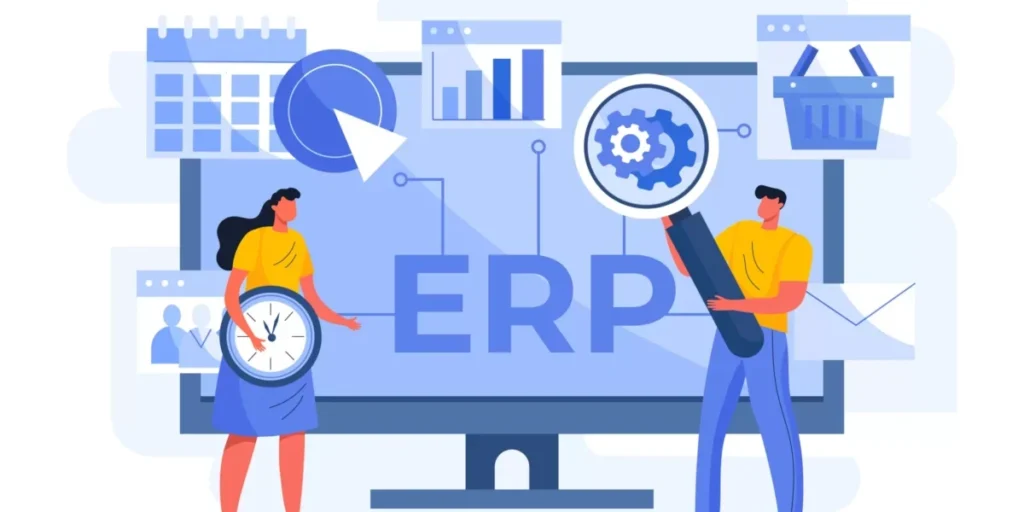An ERP (Enterprise Resource Planning) system is a comprehensive software solution designed to integrate and manage core business processes within an organization. It provides a centralized platform for handling financial management, supply chain operations, human resources, customer relationship management, and other essential functions. With businesses increasingly relying on data-driven decision-making, ERP systems have become a crucial tool for enhancing efficiency, improving accuracy, and streamlining operations.
The Concept of ERP Systems
ERP systems operate on a unified database that enables different departments within an organization to share and access information seamlessly. This integration eliminates data silos, reduces redundancies, and ensures consistency across various business functions. The primary objective of an ERP system is to facilitate real-time data sharing and provide a holistic view of organizational operations.
Initially, ERP systems were primarily used by large enterprises due to their high implementation costs and complexity. However, advancements in cloud computing and modular ERP solutions have made them accessible to small and medium-sized businesses as well. Modern ERP solutions offer flexibility, scalability, and customization to meet specific business needs.
The Evolution of ERP Systems
The origins of ERP systems can be traced back to the 1960s when organizations used simple inventory management and control systems. In the 1970s, Manufacturing Resource Planning (MRP) systems were introduced to manage production processes more efficiently. The 1990s saw the emergence of comprehensive ERP systems that integrated multiple business functions into a single software suite.
Today, ERP systems have evolved significantly, incorporating cloud computing, artificial intelligence (AI), and real-time analytics. Cloud-based ERP solutions have revolutionized the industry by offering cost-effective, scalable, and easily accessible platforms that require minimal on-premise infrastructure.
Key Components of an ERP System
ERP systems consist of multiple modules designed to support various business functions. Some of the core components include:
1. Financial Management
This module handles accounting, budgeting, financial reporting, and compliance. It provides real-time insights into financial performance, helping businesses make informed financial decisions.
2. Human Resources Management (HRM)
HRM modules manage employee records, payroll, recruitment, performance evaluations, and benefits administration. They streamline workforce management and improve employee engagement.
3. Supply Chain Management (SCM)
SCM modules optimize procurement, inventory management, production planning, and logistics. They enhance supply chain visibility, reduce operational costs, and improve delivery timelines.
4. Customer Relationship Management (CRM)
CRM modules track customer interactions, manage sales pipelines, and enhance customer service. They help businesses build strong customer relationships and improve customer retention.
5. Manufacturing and Production Planning
This module assists in managing production schedules, resource allocation, and quality control. It ensures efficient manufacturing operations and reduces production costs.
6. Business Intelligence and Analytics
ERP systems integrate business intelligence tools that analyze data, generate reports, and provide actionable insights. These tools help businesses identify trends and make strategic decisions.
Types of ERP Systems
ERP systems are classified based on their deployment models and target business size. The three primary types include:
1. On-Premise ERP
On-premise ERP systems are installed on a company’s local servers and managed by internal IT teams. These systems offer greater control and customization but require significant upfront investment and ongoing maintenance.
2. Cloud-Based ERP
Cloud ERP solutions are hosted on remote servers and accessed via the internet. They offer cost savings, scalability, and automatic updates, making them suitable for businesses of all sizes.
3. Hybrid ERP
Hybrid ERP systems combine on-premise and cloud-based solutions, allowing businesses to retain critical data on local servers while leveraging cloud features for other functions. This approach provides flexibility and security.
Benefits of ERP Systems
Implementing an ERP system offers numerous advantages that enhance business operations and efficiency:
1. Improved Efficiency
ERP systems automate manual processes, reducing time-consuming tasks and improving productivity across departments.
2. Real-Time Data Access
Centralized data management enables real-time access to accurate information, facilitating faster decision-making.
3. Enhanced Collaboration
Different departments can collaborate seamlessly by sharing data through a unified system, eliminating communication gaps.
4. Cost Savings
By optimizing resource allocation, reducing errors, and improving workflow efficiency, ERP systems help lower operational costs.
5. Regulatory Compliance
ERP systems ensure compliance with industry regulations by maintaining accurate records and generating audit-ready reports.
6. Scalability
As businesses grow, ERP systems can scale to accommodate increased data, users, and functionalities.
Challenges of Implementing ERP Systems
Despite their benefits, ERP systems present certain challenges that organizations must address:
1. High Implementation Costs
The initial investment in ERP software, training, and infrastructure can be expensive for some businesses.
2. Complexity and Customization
Customizing ERP systems to meet specific business needs can be complex and time-consuming.
3. Data Migration Issues
Transferring data from legacy systems to an ERP platform requires careful planning to avoid data loss or inconsistencies.
4. Resistance to Change
Employees may be reluctant to adopt new systems, requiring effective change management strategies to ensure smooth transitions.
5. Cybersecurity Risks
Storing sensitive business data in an ERP system necessitates robust security measures to prevent data breaches.
Popular ERP Solutions
Several ERP vendors offer solutions tailored to different industries and business sizes. Some of the leading ERP providers include:
1. SAP
SAP is a global leader in ERP software, offering comprehensive solutions for large enterprises and SMEs.
2. Oracle ERP
Oracle provides cloud-based and on-premise ERP solutions with advanced analytics and AI-driven features.
3. Microsoft Dynamics 365
Microsoft’s ERP solution integrates seamlessly with other Microsoft products, making it popular among businesses using Office 365.
4. NetSuite
NetSuite, a cloud-based ERP system by Oracle, is widely used by small and medium-sized businesses.
5. Infor
Infor specializes in industry-specific ERP solutions, catering to manufacturing, healthcare, and retail businesses.
The Future of ERP Systems
The ERP industry continues to evolve, driven by technological advancements and changing business needs. Some emerging trends shaping the future of ERP include:
1. Artificial Intelligence and Machine Learning
AI-powered ERP systems enhance automation, predictive analytics, and intelligent decision-making.
2. Internet of Things (IoT) Integration
IoT-enabled ERP systems provide real-time monitoring of assets, production processes, and supply chains.
3. Mobile ERP Solutions
Mobile-friendly ERP applications enable employees to access data and perform tasks remotely.
4. Blockchain Technology
Blockchain enhances data security and transparency in ERP systems, especially in supply chain management.
5. Low-Code and No-Code Platforms
These platforms allow businesses to customize ERP solutions with minimal coding expertise.
Conclusion
ERP systems have become an essential tool for businesses seeking to streamline operations, improve efficiency, and enhance decision-making. By integrating core business processes into a single platform, ERP solutions provide real-time insights and facilitate seamless collaboration. While challenges exist, the benefits of ERP systems far outweigh the drawbacks. As technology advances, ERP systems will continue to evolve, offering smarter, more flexible, and cost-effective solutions for businesses of all sizes. Organizations that invest in ERP solutions today will be better positioned to adapt to future market demands and maintain a competitive edge.
















